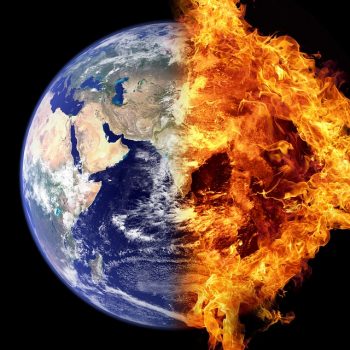 The EU’s statistical agency Eurostat announced Thursday (4 May) that CO2 emissions resulting from the EU’s energy use have “slightly decreased” in 2016, compared to the year before. But Eurostat’s press release did not mention that the small decrease has not made up for the small increase in CO2 emissions the year before and that more CO2 was emitted in 2016 than in 2014. In other words, last year’s CO2 emissions increased by 0.29 percent compared to 2014, which means that for the second consecutive year the EU’s carbon emissions are higher than in 2014, albeit very slightly. —EUObserver, 5 May 2017
The EU’s statistical agency Eurostat announced Thursday (4 May) that CO2 emissions resulting from the EU’s energy use have “slightly decreased” in 2016, compared to the year before. But Eurostat’s press release did not mention that the small decrease has not made up for the small increase in CO2 emissions the year before and that more CO2 was emitted in 2016 than in 2014. In other words, last year’s CO2 emissions increased by 0.29 percent compared to 2014, which means that for the second consecutive year the EU’s carbon emissions are higher than in 2014, albeit very slightly. —EUObserver, 5 May 2017
Tesla’s SolarCity reported a drop of nearly 40 percent in solar installations for the first quarter on Wednesday, the latest sign of a reversal in fortunes for the once high-flying residential solar industry. Across the sector, installers report more difficulty finding customers. Subsidies have dwindled or been eliminated in some states, and many of the easiest consumers to sell to ‚Äì environmentally conscious homeowners with disposable income ‚Äì have already purchased rooftop systems. —Reuters, 5 May 2017
Tesla shares were on track for their biggest one-day decline in more than 2 months on Thursday after the electric automaker posted a wider-than-expected first quarter loss and as some second guessed the company’s ability to hit its delivery target. While Elon Musk said the company remains on track to produce 5,000 of its eagerly awaited mass-market Model 3 vehicles a week by the end of this year and 10,000 a week before the end of 2018 — some have expressed the company’s doubts about meeting that goal. —Financial Times, 5 May 2017
When it comes to solar energy, we are employing a very large number of workers who produce a very small amount of electric power ‚Äì a sure sign of economic inefficiency. Today’s most productive energy workers are in coal and natural gas, not solar. And there’s only one reason that the solar workforce has been increasing so rapidly (25 percent gain last year) despite its dismal record of worker productivity and a minuscule share of U.S. electric power — government policies that have subsidized the solar industry nearly 350 times more than fossil fuels per unit of electricity production. –Mark J Perry, Washington Examiner, 3 May 2017
A key architect of the Paris climate agreement says countries are not allowed to scale back their pledges, which undercuts arguments made by supporters of the global warming accords. One of the arguments for staying party to the Paris agreement is the deal allows countries to weaken their pledges to cut greenhouse gas emissions. This argument has been advanced by pro-Paris Republicans and former Obama administration officials with an interest in keeping the U.S. in the agreement. But Laurence Tubiana, France’s climate diplomat in 2015, said the Paris agreement does not allow countries to weaken their pledges, despite what Paris supporters argue. “The text is very clear,” Tubiana told E&E News. “The sense of the direction is really progress; it’s not going backward.” –Michael Bastasch, Daily Caller, 4 May 2017
In deciding what to do about the Paris Agreement, the president faces a more extreme situation than George W. Bush when he repudiated the Kyoto Protocol in 2001. Four years earlier, the Senate had unanimously adopted the Byrd-Hagel resolution effectively vetoing Kyoto. By not allowing the Senate to administer the protocol’s coup de gr√¢ce, Mr. Bush brought all the political opprobrium on himself. In joining the Paris Agreement without Senate consent, Mr. Obama unilaterally nullified precedent and extinguished specific executive-branch pledges. Mr. Trump can restore the constitutional balance and further his own policies by submitting the Paris Agreement to the Senate. –Rupert Darwall, The Wall Street Journal, 5 May 2017

















Let’s see now CO2 doubles and temperatures are flat . CO2 in Europe is
supposedly flat … can a declaration of a slightly cooling planet be expected any day ?
What ever happened to all those grossly overstating climate modelers ?
Walmart greeters or Berkeley night school retraining ?
The price of petrol in Europe is so expensive you’d think that no one has been wasting it. What room do they have to cut back?
Eurpoes mistake steering down the road of enviromental soclism driving down watermellon lane and streight into poverty and ruin